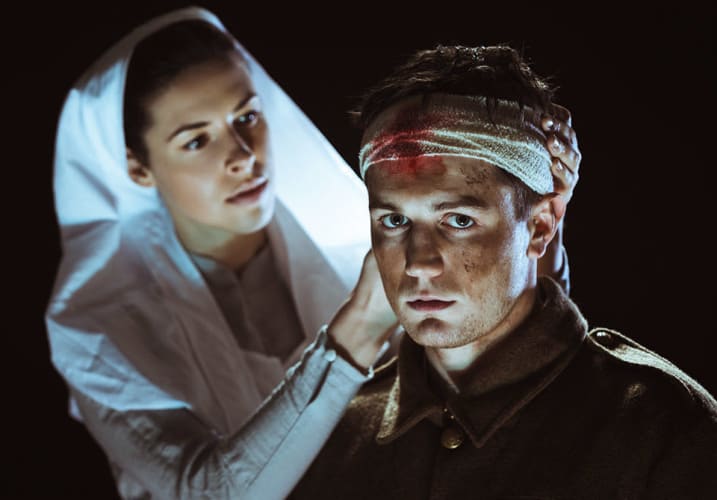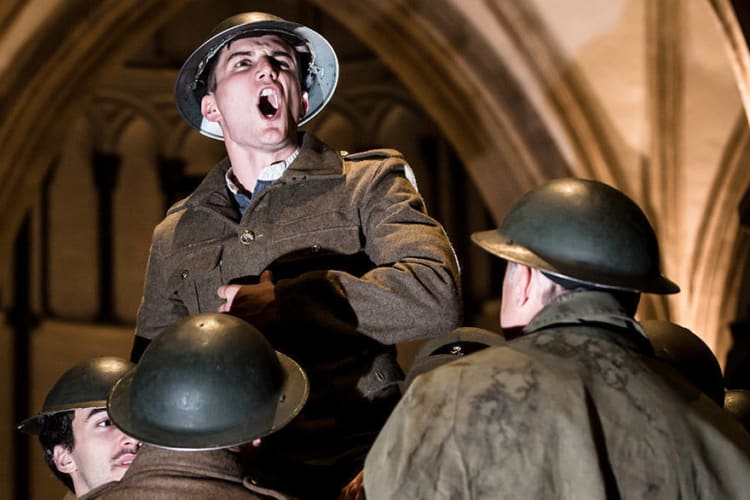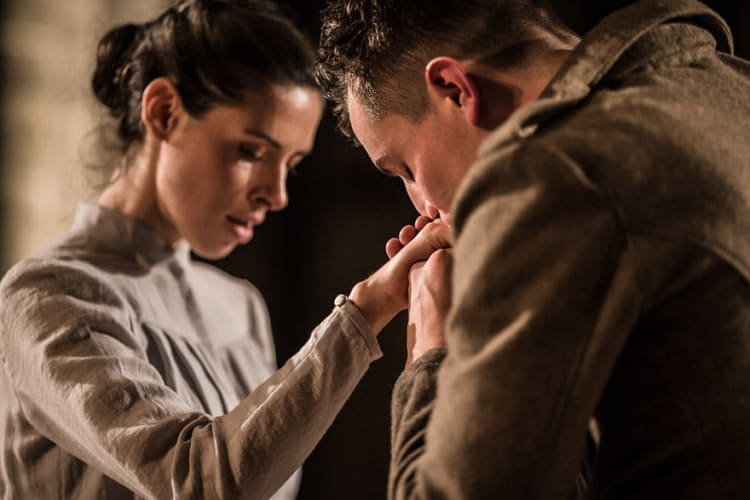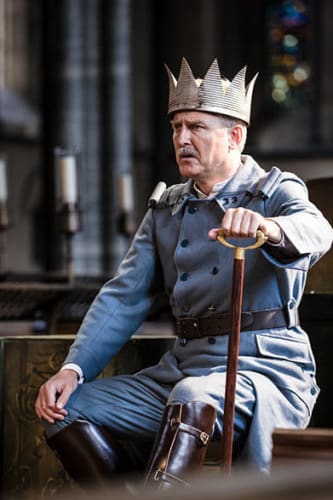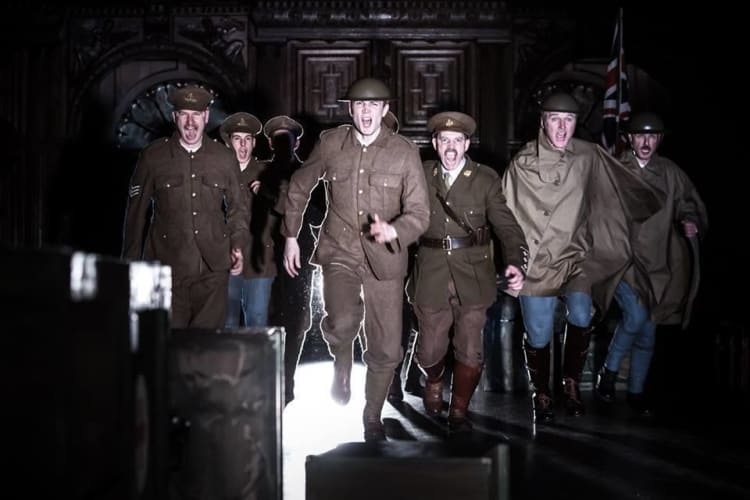Antic Disposition’s production was seen in London last year, when it marked the 600th anniversary of the Battle of Agincourt, performed (with a slightly different cast) in the Temple Church.
Dressed in the uniforms of the First World War, it also commemorates that conflict and, refashioned to fit the hall where Shakespeare’s own company played, the 400th anniversary of his death.
Co-directors Ben Horslen and John Risebero have given it a framing a device intended to aid acceptance by the French audiences to which the original production toured. It becomes a performance given by recovering French and English soldiers and the nursing staff in an allied field hospital during that First War.
Together with the insertion of song settings of passages from A E Houseman’s A Shropshire Lad that accompany episodes of military life, this parallels experience across the centuries bringing new insights and a new dimension to the play. It's moving, funny and theatrically engaging.
Nurses and arriving wounded hurry along the passage at the gallery end of the hall. A French soldier helps an English soldier in; a nurse inspects the Frenchman’s eyes, a reminder of those who were gassed. The thankful Tommy gives Frenchie a present: a book.
It is easy to recognize as an early Arden edition. It’s Henry V and the Frenchman is offended but then the nurse explains that he’s been given a treasured possession. So comrades in arms come together to stage a play about their former fighting, their shared history.
A British Captain begins the opening chorus but soon, and through the play, it is passed on to different voices. A hesitant squaddie, an Archbishop of Canterbury unsure of his lines, launches into the complex explanation of Salic law that opens the play, giving it a comic element without the heavy going of Olivier’s film version.
Its arguments may make you think of Blair's WMD sophistry but it sets a lighter mood that remains for the Pistol and Bardolph scenes and highlights the comedy in the play. The political argument and even Harry leading his forces at Harfleur can feel like interruptions in the common soldier’s story rather than the other way around.
We see them being recruited and kitted out, posing for proud photographs in their new uniforms. Mistress Quickly’s farewell becomes every wife and mother waving her men off to war, the parting with Falstaff’s page a poignant moment and that old knight’s death a marker of the way the world is changing.
We see the change in the new king too. Harry of Monmouth seems to be experimenting with kingship, an edge of cruelty sometimes, diplomat’s language masquerades as honesty, but fresh-faced Freddie Stewart makes him a king who not only learns fast but gains humanity.
Nevertheless, when old acquaintance Bardolph is to be executed for disobeying orders and stealing from the French, it is Henry who here is ready to carry out his execution, a dramatically contrived moment that sees both character and soldier actor break down in a fit that might now be recognized as a symptom of PTSD.
The scene is interrupted; Bardolph’s fate uncertain, but nurses tend the twentieth-century soldier. When Henry addresses them before the battle, you can’t help feeling this is a speech he has carefully worked on but in which may not himself believe.
This is an Agincourt with no French knights on horseback, no English longbow men. Battle becomes the flash and boom of the artillery echoing everywhere with both armies a frozen tableau in darkness. Again, the thirteenth and the twentieth century co-exist in the twenty-first.
There has been some deliberate softening of the story. Among the many cuts, the executions before the English fleet sets sail have gone; so has Henry’s order to kill French prisoners. Purists will find much missing, but this has become a play that not only rallies the common soldier in speeches so often borrowed for patriotic purposes but is about those soldiers and a moving tribute to them.
Though troubles returned to England later, Henry goes off to marriage and two kingdoms. These First World War soldiers go back to the front.
There are strong performances and fine speaking throughout from a mixed French and British cast. Everyone, except for the two kings and Floriane Andersen’s delightful, dancing Princess Katherine, doubles in distinct characterisations. Out of role, Maurice Byrne’s troubled Charles VI of France becomes another patient and Katherine and Henry a nurse and an ordinary soldier, touchingly forced to part when he goes back to war.
There is Louise Templeton as softhearted Mistress Quickly and Katherine’s amusing attendant Alice, trying to teach her English, Dean Riley the Boy and a pesky Dauphin, James Murfitt both Bardolf and a Geordie Gower. James Lavender is Archbishop and Pistol; Andrew Lewis’s smart captain stylishly starts of the Chorus and follows aristocratic Exeter with commoner Bates. Jake Samuels is Fluellen and the Bishop of Ely and Louis Bernard. Marius Hesper and Stephen Lloyd also deserve mention for this is a closely-knit ensemble in which everyone is important.
Shakespeare wrote a play in which England’s victory at Agincourt with minimal loses and thousands of French dead could be called upon for patriotic celebration; here the clarity of Henry’s pious attribution of everything to Heaven makes it less bombastic (though even that might be a public posture) but more importantly it becomes a play about the soldiers and not just a build-up to one battle but the cost of an ongoing war.
Following this Middle Temple staging, the production will tour to cathedrals and churches in Winchester, Christchurch, Salisbury, Sherborne, Bristol, Gloucester, Worcester and Stratford-upon-Avon (playing in the church where Shakespeare is buried).
